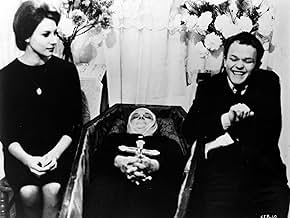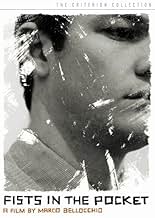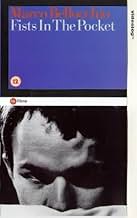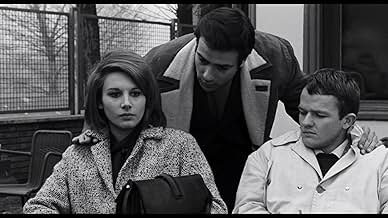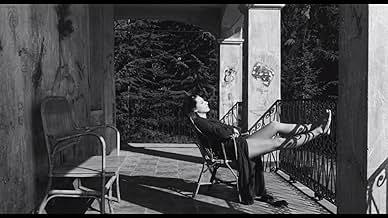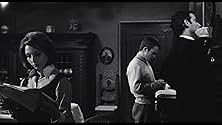NOTE IMDb
7,5/10
5,4 k
MA NOTE
Un jeune homme prend des mesures drastiques pour débarrasser sa famille dysfonctionnelle de ses nombreux problèmes.Un jeune homme prend des mesures drastiques pour débarrasser sa famille dysfonctionnelle de ses nombreux problèmes.Un jeune homme prend des mesures drastiques pour débarrasser sa famille dysfonctionnelle de ses nombreux problèmes.
- Réalisation
- Scénario
- Casting principal
- Récompenses
- 4 victoires et 5 nominations au total
Pier Luigi Troglio
- Leone
- (as Pierluigi Troglio)
Jeannie McNeil
- Lucia
- (as Jenny Mac Neil)
Avis à la une
I quit watching after 30 minutes, wasn't interested in the storyline and it seemed to be going nowhere. I found it boring and I wasn't interested in the characters.
When this film first appeared in the 1960s, the effect was so startlingly individual: there had never been a film as bold, as seemingly unhinged, yet as ruthlessly controlled, as this first feature by Marco Bellocchio. The wonderfully atmospheric black-and-white cinematography seemed to be developed from some dingy dream which dared to bring out into the open the most heinous family secrets, yet the utterly dispassionate fury which animated the most frenzied sequences was so freakish it was almost funny. This constant tension somehow allowed for a sneaky kind of compassion to enter the movie, so that the family dynamics, though extreme, seemed to come out of a common nightmare. FISTS IN THE POCKET remains an embattled cry for a new society, by focusing on the remnants of the diseased upper classes, yet this tale of sound and fury seems to have been made in the kind of frenzied reverie that is analogous to the stream-of-conscious jumble which William Faulkner used at the beginning of THE SOUND AND THE FURY, and to the same effect, i.e., to chart a family's disintegration as a mirror to the decaying grandeur of a dying society.
Pimpin places a call to his favorite writer Michel Houellebecq.
Pimpin: Hello.
Michel: Hello. Who is this?
Pimpin: Michel, its me Pimpin.
Michel: What do you want?
Pimpin: Sorry to disturb. I wanted to discuss a film that I watched. I wanted to hear your thoughts on it. Its this Italian film - Fists in the Pocket by Marco Belloccio. Came out in the 60s.
Michel: OK.
Pimpin: What do you think about it?
Michel: It did have a couple of nice pieces of ass. Paola Pitagora was unforgettable.
Pimpin: Hahahha. I agree. What did you think about the film?
Michel: Well, it was one of those films where the protagonist rebelled against his family and Catholic values. You know what I think about all that stuff, Pimpin. Nothing good came out of it. Sure, a lot of people escaped their families. And then they went and lived alone. Did drugs. Drank a lot. Individuality and personal freedom. Look at where all that got Europe now.
Pimpin: I thought the film was quite slow.
Michel: Its a piece of crap. But then, it was made in the 60s.
Pimpin: I did some research on it. The film apparently predicted the student and youth riots of the late 60s in Italy.
Michel: Hahahah. You really bought into all that crap?
Pimpin: I know its a bit like how Indian social commentators use crappy films like Deewar to explain the 70s and 80s.
Michel: Exactly. Its completely phony Pimpin.
Pimpin: I'm still confused. I don't know what to think about the film. I mean, the film is quite depressing.
Michel: Well, tell me something about the cinematography, pacing and background score. That would help us interpret it better.
Pimpin: It was a very stark film. Morricone's score was very bleak. The score is played during all the murder and post-murder scenes. It is one of Morricone's bleakest scores. I liked the way some of the scenes were framed. Like at the party where the rebellious protagonist is sitting alone and there are a lot of people dancing. He does not even drink. He has no bad habits. But he wants to kill off his family. The pacing was slow.
Michel: Did you identify with the film?
Pimpin: Sort of. But like I said it was too slow. The actors were great. The director was quite successful in capturing the claustrophobic environment in which the family lives.
Michel: Did you get married recently?
Pimpin: Yes.
Michel: So you are not to be trusted.
Pimpin: Why?
Michel: You would have liked this film a lot more during your wild bachelor days.
Pimpin: Thats probably true, Michel.
Michel: It is.
Pimpin: I did think that it was a very personal film. I mean, the director is very talented. He did portray the ills of the bourgeois life and the life lived on pure instinct quite well. I don't think he was rooting for either.
Michel: Did it work as a murder mystery?
Pimpin: No. I think it works best as the zeitgeist of that time in Italy. But it was quite boring for me.
Michel: OK. Is there anything else that you want to discuss?
Pimpin: The actors were great. I mean, most of them were better than the ones in the worst Indian movies. But I would not watch another movie because anyone of them were in it.
Michel: OK.
Pimpin: Read about he Paris attacks. Quite scary.
Michel: (Silence)
Pimpin: Hello?
Michel: Pimpin, you weren't too impressed by this film. In fact, you were bored to death. You only called me because it had an 8 rating on IMDb.
Pimpin: You are right, Michel.
Michel: Take care, Pimpin.
Pimpin: Bye, Michel.
Michel: Bye
Pimpin: Hello.
Michel: Hello. Who is this?
Pimpin: Michel, its me Pimpin.
Michel: What do you want?
Pimpin: Sorry to disturb. I wanted to discuss a film that I watched. I wanted to hear your thoughts on it. Its this Italian film - Fists in the Pocket by Marco Belloccio. Came out in the 60s.
Michel: OK.
Pimpin: What do you think about it?
Michel: It did have a couple of nice pieces of ass. Paola Pitagora was unforgettable.
Pimpin: Hahahha. I agree. What did you think about the film?
Michel: Well, it was one of those films where the protagonist rebelled against his family and Catholic values. You know what I think about all that stuff, Pimpin. Nothing good came out of it. Sure, a lot of people escaped their families. And then they went and lived alone. Did drugs. Drank a lot. Individuality and personal freedom. Look at where all that got Europe now.
Pimpin: I thought the film was quite slow.
Michel: Its a piece of crap. But then, it was made in the 60s.
Pimpin: I did some research on it. The film apparently predicted the student and youth riots of the late 60s in Italy.
Michel: Hahahah. You really bought into all that crap?
Pimpin: I know its a bit like how Indian social commentators use crappy films like Deewar to explain the 70s and 80s.
Michel: Exactly. Its completely phony Pimpin.
Pimpin: I'm still confused. I don't know what to think about the film. I mean, the film is quite depressing.
Michel: Well, tell me something about the cinematography, pacing and background score. That would help us interpret it better.
Pimpin: It was a very stark film. Morricone's score was very bleak. The score is played during all the murder and post-murder scenes. It is one of Morricone's bleakest scores. I liked the way some of the scenes were framed. Like at the party where the rebellious protagonist is sitting alone and there are a lot of people dancing. He does not even drink. He has no bad habits. But he wants to kill off his family. The pacing was slow.
Michel: Did you identify with the film?
Pimpin: Sort of. But like I said it was too slow. The actors were great. The director was quite successful in capturing the claustrophobic environment in which the family lives.
Michel: Did you get married recently?
Pimpin: Yes.
Michel: So you are not to be trusted.
Pimpin: Why?
Michel: You would have liked this film a lot more during your wild bachelor days.
Pimpin: Thats probably true, Michel.
Michel: It is.
Pimpin: I did think that it was a very personal film. I mean, the director is very talented. He did portray the ills of the bourgeois life and the life lived on pure instinct quite well. I don't think he was rooting for either.
Michel: Did it work as a murder mystery?
Pimpin: No. I think it works best as the zeitgeist of that time in Italy. But it was quite boring for me.
Michel: OK. Is there anything else that you want to discuss?
Pimpin: The actors were great. I mean, most of them were better than the ones in the worst Indian movies. But I would not watch another movie because anyone of them were in it.
Michel: OK.
Pimpin: Read about he Paris attacks. Quite scary.
Michel: (Silence)
Pimpin: Hello?
Michel: Pimpin, you weren't too impressed by this film. In fact, you were bored to death. You only called me because it had an 8 rating on IMDb.
Pimpin: You are right, Michel.
Michel: Take care, Pimpin.
Pimpin: Bye, Michel.
Michel: Bye
Beautifully filmed, with nice cinematography and camera movements, mostly in indoor footage, the novienis also interesting in its unique subject. While the development of the story is perhaps too slow in the beginning (although with some grat scenes), the film becomes incrisingly disturbing. Hatred for family, order and tradition is portrayed as aiming a final solution - if you understand what I mean... All members of the family (in different ways, all of them are overly self-centred) are well developped in their dysfunctional relationship, phisically represented in blindness, intellectual disability and epilepsy. Curiously, a "handicapped" himself is moved by a creepy cleansing impulse. Even his closest person, his beautiful sister, with whom he has a complicity relatiinship, is not out of danger.
This is a very good movie, but it's certainly not for anyone. I can't even fathom it's been created 60 years ago, it's too insane, bleak, weird. There is not even one likeable character. Some of them are not unlikeable but they're just too uninteresting to root for, so the viewer focuses on the unlikeable ones. And as a character study, this movie is exciting to watch, because the protagonists are faschinating. Alessandro, Julia and, incidentally, Augusto.
It's like watching a car accident. You're afraid that you will see some ugly things when you're passing by, things that might haunt you but you can't help yourself and you take a look.
Funny thing : Whereas it's bleak, it still remains entertaining and exciting. Things get nasty at some point, but it never gets unbearable to watch. I was curious to see where it goes even though i sensed that there are no happy endings here, and i am not too fond of sad ones.
Acting is amazing. Lou Castel's acting performance is like it's coming from the future, too fresh and timeless.
FISTS IN THE POCKET is a very good psychological drama (-thriller). Beware though, it's not for the faint of heart.
It's like watching a car accident. You're afraid that you will see some ugly things when you're passing by, things that might haunt you but you can't help yourself and you take a look.
Funny thing : Whereas it's bleak, it still remains entertaining and exciting. Things get nasty at some point, but it never gets unbearable to watch. I was curious to see where it goes even though i sensed that there are no happy endings here, and i am not too fond of sad ones.
Acting is amazing. Lou Castel's acting performance is like it's coming from the future, too fresh and timeless.
FISTS IN THE POCKET is a very good psychological drama (-thriller). Beware though, it's not for the faint of heart.
Le saviez-vous
- AnecdotesThe house, the film's main location, is the house director Marco Bellocchio spent his childhood days in.
- GaffesWhen the whole family is having dinner, Augusto is seated at one corner of the table and the mother is sitting on a side at the other corner. The cat is shown to be eating meat off the mother's plate in one scene, but in the next scene Augusto is shown picking up the cat as if was right next to him on the table. Once he removes the cat, the next camera angle again shows Augusto and the mother at opposite ends.
- Citations
Alessandro: I'm a volcano of ideas.
- ConnexionsEdited into Sorelle (2006)
- Bandes originalesExcerpt from La Traviata
composed by Giuseppe Verdi (uncredited)
lyrics by Francesco Maria Piave (uncredited)
Meilleurs choix
Connectez-vous pour évaluer et suivre la liste de favoris afin de recevoir des recommandations personnalisées
- How long is Fists in the Pocket?Alimenté par Alexa
Détails
- Date de sortie
- Pays d’origine
- Sites officiels
- Langues
- Aussi connu sous le nom de
- Fists in the Pocket
- Lieux de tournage
- Société de production
- Voir plus de crédits d'entreprise sur IMDbPro
- Durée1 heure 50 minutes
- Couleur
- Mixage
- Rapport de forme
- 1.85 : 1
Contribuer à cette page
Suggérer une modification ou ajouter du contenu manquant

Lacune principale
By what name was Les poings dans les poches (1965) officially released in India in English?
Répondre
![Regarder Trailer [OV]](https://m.media-amazon.com/images/M/MV5BNjc5ZDU5NDgtZTliZC00MjQwLThjNjItMDhjZmFmZGMxZTI2XkEyXkFqcGdeQXRyYW5zY29kZS13b3JrZmxvdw@@._V1_QL75_UY281_CR6)

